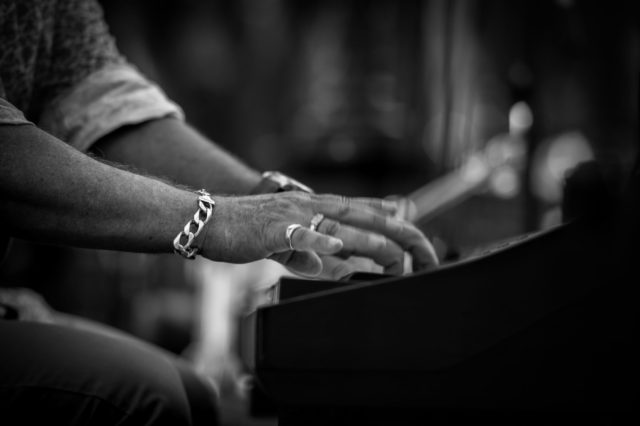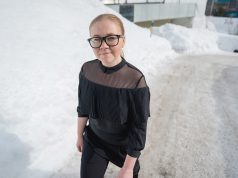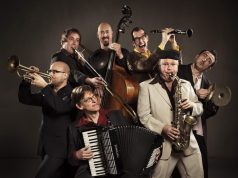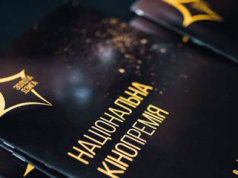Play, play my old friend, don’t stiffen, don’t fade. Chase the blood of your arteries, tell us about fear, about love. Pianissimo here, and here full stop. Now you are tired. Have a rest, pour a drink. Get drunk with your beer, turn a clown and deceive us. Just wait, just you wait. Only play and live. Only live and play, don’t die.
Don’t die. But it hasn’t turned out that way, it turned another way, he has died. It’s a month since he is not here, and I hear different pieces of his music in my head, I see multi-colored pieces of life right in my head, I have collected these pieces over 30 years of listening to his music. 20 of those 30 we’ve been friends. I owe those pieces of life to these pieces of music. I owe them to him. I have to write them down.
August 1999, Varna. During random walks in the old part of town, absolutely independently from each other, Yura and I knocked against the old street named “Czar Ivan Shishman”, absolutely independently of one another we both read the surname with an accent on the first syllable, independently we both burst out laughing, imagine that Bulgaria had once a Jewish czar Shishman, quite anecdotal. We shared impressions and laughed together. Tolya Vapirov, who was there, reported that the correct accent in a surname — on the second syllable. The next evenings our company, minus the children who have fallen asleep and Yurka, who was fairly drunk and and also felt asleep, stayed on the beach. Round midnight, we saw Yura on the partly destroyed stairway leading from the hotel to a beach, which was dangerous even for a sober person during daylight. He didn’t respond to any calls, just went down and rushed into the sea. The sea was warm and pleasant, but seas are always dangerous. Anyone who has been close to drowning knows this. I had been once before and therefore immediately followed him into water. You’d never know what’s up there from the coast and even if you know, then you won’t be there in time. Yura swam quite far when I have caught up with him. He didn’t want to come back and was in the mood for a scandal. We swam for a while, then he suddenly headed out to the coast. And me too, of course. Swimming sobered him up a little bit, but not too much. Natasha persuaded him to go to the hotel with everyone, yet he stayed unaffected and attempted to run from her away. I stopped him by catching his hand and started to talk to him in more or less random phrases but in a calm, quiet and convincing tone. Yura effortlessly tried to free his hand. I understood that a quiet voice wouldn’t work, that one need a real arguments, not just a tone. And these arguments were found. “Listen”, – I told him. “Here we saw a street named after one person. He was probably a clever person with many accomplishments. Shishman was his name. Yurka, with all possible responability I’m telling you: there, where you going to go, Ivan Shishman would not go, no way. He wasn’t that stupid to go down the slippery wet stones. Shishman would not go there”. Yura finally looked at me with interest and asked: “Then where would he go?” I pointed to the stairs and told him: “There. Shishman would go there. Because that is Ivan Shishman’s path. He would go on that path”. It was an airtight argument. Unbreakable even. So Yura obediently followed Shishman’s track. At some point he misstepped and flagged on my hand upon dangerous stones. But I had held him. By a miracle. And so we walked together down Shishman’s path, and reached our hotel, and then his room where he immediately fell asleep. I left the room and was met with applause from those who had witnessed the story. The next morning, Yura began to call me Shishman (it was the only thing that he remembered), and I started to call him Shishman too.
Another story from then and there. It was a very long night. We sat against each other on the balcony of the Varna hotel Breeze-2, with only a liter bottle of “Lafroaig”, which I had bought on the Romanian-Bulgarian border, between us. Yura was telling me about the doubts, pains and fears from different times of his life, it was was probably a moment for him, when he most needed to share. We sometimes went to other subjects, to speak of other’s music, but he steadily came back, and he did not say a word about what, as it seemed to me, was his deadliest, maybe his main recurring nightmare: to not actualize himself. Poor Yurka, poor all the artistic people, for they need recognition from outside, and I recalled the case of Glen Gould – musician fully devoted to the perfection of his music, who did not need any external confirmations of his rightness. “Self-esteem is inside of you”, I told him, “you don’t need anyone else’s approval. It’s just you and the sound.” We slowly sipped the whisky and stayed absolutely sober, as if we were sipping water. No drunkenness at all. Alcohol, peat smoke and the Atlantic’s salt were passing perhaps to those heavens music comes from – I have always thought that real music isn’t created, but it is overheard from the unknown spaces of this huge world. I wanted to tell him that “Yurka, darling, you are gifted (and I am not), you hear the music (me too though), you are able to play what you hear (which I can not do), you have something to do in this life, everybody knows (and me too, but just a few know about it). Don’t worry, don’t torment your mind, just play it.” I don’t know whether I managed to get this across to him, this very basic thought.
We were only forty-six then, only forty-six. Our wives was sleeping hours ago, but we talked and talked – openly, deeply and quietly. His words in one of his last interviews echoes that old conversation.
Now a piece of other times. Several times in our life Kusnetsov played for me. I had never asked.It would not have occurred to me to ask a plasterer to plaster my wall for free – nor would I ever ask an artist to give me his art as a gift. No, Yurka did it by himself, of his own accord, it was always a gift and it was always a miracle.
But once there was an even bigger miracle – I witnessed him playing for himself. It was in the summer of 2010, we arrived from Moscow back to Odessa, and Natasha (ed. Natalya Ertnova – Kuznetsov’s wife) was at his summer house, and one evening Yurka dropped in to our place on Knyazheskaya street. No, he did not just dropped in. When Lyuba made gazpacho soup, she just let him know, and he appeared in fifteen minutes flat. We ate the gazpacho, and had conversation about music, and I turned on E.S.T., Esbjörn Svensson Trio (thanks, Tema Lipatov!). Yura listened with both of his ears, and then stretched his arm to the piano nearby. I began to discourage him because the piano was catastrophically untuned, but he was relentless. He was in need.
And so he fitted into E.S.T. Not without mistakes, but he fit in and didn’t break the form set by Svensson. Those who didn’t listen heavily to E.S.T., they wouldn’t even notice. After the third or fourth composition, Yura asked: “Who are they, I want to play with them. At a festival, at a concert, at any event.” I told him that it was impossible, and that, unfortunately, Svennson had already played his last concert in this world. “How?” Yura asked, and I told him what I knew about Svennson death. “Turn them on”, he demanded, and started to play again.
This lasted almost an hour and a half. Yura turned his head and spoke: “What a power, yeah? He plays there, and I am still here. Isn’t it a wonder?” I silently translated his question from Russian into Russian: “If people listen to my music – I won’t die”? I hugged him.
We parted at threeish, and Yura asked me to record everything that I had of E.S.T. in the machine and out, and I happened to have it all with me, and recorded it all for him. He listened to them for a long time afterwards and even thanked me again afterward.
And I answered ‘your welcome ’ politely but silently I thought to myself, ‘’why?’’ I was lucky enough to be a witness witness and even – here comes out my arrogance – to provoke a miracle.
But that was then. The next day, my neighbor Felix approached me and scolded me: “Oleg, you didn’t let me sleep half of the night, were you playing music?” I answered that it wasn’t me, that it was Yura Kuznetsov. The usually severe Felix, the scourge of Odessa tax collectors, instantly changed his countenance and asked: “Why did you not call me?”
Such is the force of music, of a real musician. He plays with the dead musicians and turns severity into understanding. I saw it. My ears heard it.
“Hello, Shishman!” he welcomed me.
“Hello, Shishman!” I answered him.
So we welcomed each other from that August – for the last time in January of this year. We were two Shismans, and now I’m alone. Shishman. Kuzya, Yurka, Yury Kuznetsov, the musician inspired by God, plays for him now.
Oleg Shestopalov is a writer living in Moscow.




































